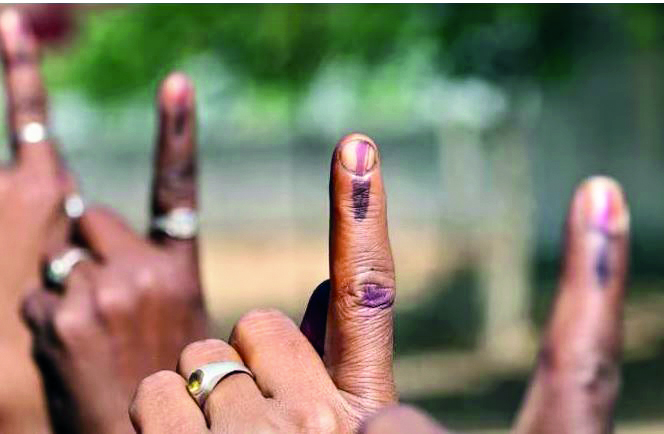Lok Sabha elections 2024 set to test political waters

Nilgiris: The scenic Nilgiris is poised for a fiercely contested Lok Sabha election set to unfold on April 19, in the first phase.
Sitting Lok Sabha member A Raja, representing the DMK, faces a formidable challenge from BJP candidate L Murugan, who serves as a Union Minister.
Allegations of favoritism towards Raja by the electoral officer have intensified the political fray in this constituency. As the political landscape, this constituency that promises to be a battleground of ideologies and aspirations is the serene Nilgiris, nestled in the southern state of Tamil Nadu. With its rich political history, diverse electorate composition, and pressing issues, the Nilgiris Lok Sabha constituency also stands poised for a highly contested battle.
Further, in the spotlight are DMK candidate A Raja, and Union Minister and BJP candidate L Murugan, whose electoral campaigns are already marred by allegations of favoritism and heated exchanges. The constituency, reserved for Scheduled Castes, is expected to witness a four-cornered contest with the inclusion of AIADMK’s Lokesh Tamilselvan and Naam Tamilar Katchi’s A Jayakumar.
In the upcoming Lok Sabha elections, A Raja, who secured the seat with a significant margin in 2019, with the presence of 25 lakh Sri Lankan repatriates further, complicates the electoral dynamics, potentially influencing the outcome of the election. Despite his entrenched position as the constituency’s representative over multiple terms, palpable resentment against him is evident during a tour through the region.
Voices of discontent echo across the hills, with locals expressing disillusionment with the DMK’s perceived lack of tangible development initiatives. The sentiment of “Raja has done nothing for the constituency” resonates strongly among residents, fueling skepticism about his candidacy.
In contrast, BJP candidate L Murugan emerges as a dynamic contender, propelled by a vigorous campaign and support from the RSS-BJP base. Murugan’s tireless efforts to connect with voters, particularly in key areas like Coonoor and Ooty, have bolstered BJP’s visibility and resonance on the ground. Despite initial doubts regarding Murugan’s motivation to contest, his relentless campaigning and engagement with constituents have garnered widespread attention and support.
The grassroots momentum behind BJP’s campaign is palpable, with voices of resentment against the DMK resonating across diverse segments of society. From small business owners to street vendors, there is a growing chorus of dissatisfaction with the status quo, translating into a surge of support for BJP.
Moreover, as the electoral battle intensifies, AIADMK’s candidate Lokesh Tamizhselvan remains in the background, with BJP emerging as the primary challenger to DMK’s dominance.
In the 2021 assembly elections, winners in five of the six constituencies within the Nilgiris Lok Sabha constituency clinched victory by narrow margins. While four seats were secured by AIADMK, one each was won by Congress and DMK. This suggests a closely contested political landscape, ripe for possible electoral surprises.
This parliamentarian constituency further holds a significant political legacy. Its history includes seven victories for the Congress, starting with C. Nanjappa’s win in 1957. The Nilgiris constituency, spanning Coimbatore, Nilgiris, Erode, and Trippur districts, comprises six Assembly seats. The AIADMK holds dominance in four, while the Congress and DMK control one each, and are led by MK Stalin.
Notably, R. Prabhu holds the record for the longest tenure as MP, securing the seat for four consecutive terms from 1980 to 1991 and later in 2004 under the Congress banner. He served as a cabinet minister in the Rajiv Gandhi government. Additionally, Master Mathan of the BJP clinched victory twice from this constituency. S. R. Balasubramaniam, representing Tamil Maanila Congress, won in 1996 and later served as a Union Minister of State. The electoral history of Nilgiris showcases the Congress holding the seat for seven terms, while the DMK and AIADMK each held it for three and two terms respectively. The BJP also secured the seat for two consecutive terms, and once by the Swatantra Party represented by M.K. Nanja Gowder in 1971. Presently, A Raja, a senior DMK leader and former Union Minister, represents the constituency, having won in 2009 and 2019 despite controversies like the 2G Spectrum scam.
The demographic composition of Nilgiris electorate reflects a harmonious blend, with rural voters comprising 52 per cent and urban residents making up 48 per cent. Hindus form the majority at 90 per cent, followed by Muslims at 5 per cent, with the remaining 5 per cent representing various other communities.
Scheduled Caste (SC) voters constitute 24 per cent of the electorate, while Scheduled Tribes (ST) account for around 4 per cent.
Beyond the political rhetoric and campaign trails, the Nilgiris constituency grapples with pressing issues that demand immediate attention. The human-animal conflict, exacerbated by the convergence of elephant migration corridors, poses a significant challenge to local authorities.




